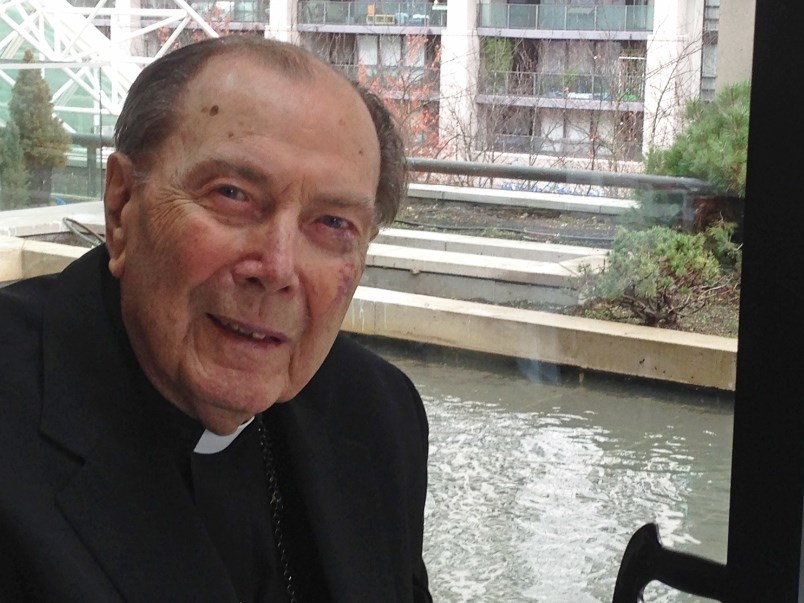A BC Supreme Court judge is left to determine how an Archbishop understood sexual assaults to be harmful more than 40 years ago.
The court has already heard that Kamloops Roman Catholic Diocese officials knew of the alleged sexual activities of Father Erlindo “Lindo” Molon before a church schoolteacher reported months of abuse by Molon in 1977.
That teacher, Rosemary Anderson, now 70, alleged in a Dec. 22, 2016, notice of civil claim that sexual abuse at the hands of Molon, now 88, started when she was 26. She names Molon and the Roman Catholic Bishop of the Diocese of Kamloops, A Corporation Sole in the claim.
Molon’s superior at the time Archbishop Adam Exner, now 90, conceded in court that Molon “was molesting people,” including Anderson.
What remains to be determined by Justice David Crossin is the extent of punitive damages the church must pay. To that end, to determine how liable the church was Justice Crossin must assess how Exner understood the extent of harm being inflicted by Molon on Anderson and other women.
“In 2019 we have much more sophisticated insightful and constructive understanding of the harm and damages these relationships can cause,” said Crossin in court Thursday, adding much has changed with sexual assault laws since 1976.
In determining the harm Molon, Exner and the church knew or ought to have known was being done to Anderson, Justice Crossin and Anderson’s lawyer, Sandra Kovacs, agreed they must view the situation from the lens of a “reasonable person” at that time.
Kovacs put forth her argument throughout the day while diocese lawyer John Hogg is expected to counter her claims March 10 as the months long proceedings were delayed further.
Last October in court, Kovacs said Molon “raped” Anderson 75 to 100 times; while it was also suggested Hogg was minimizing her client’s case. And while Exner admitted Molon had inappropriate relationships with church members, Kovacs has previously argued Exner’s primary interest at the time was preventing a scandal.
That line of reasoning continued Thursday.
“There’s an acknowledgement of harm, straight out of the bishop’s mouth,” said Kovacs.
“He knew there was harm. She was raped,” she said.
Justice Crossin questioned whether it was entirely clear Exner understood the level of harm.
Kovacs responded by arguing the “reasonable person” test must take into account what a reasonable religious person would do – and not what a reasonable secular person would do, given the church’s purported extra moral considerations around sexual activity.
“In his religion under canon law, fornication is a sin and adultry is a sin. Both sins are harmful to the soul,” said Kovacs.
Justice Crossin said, “The test is to establish that Father Exner knew or ought to know there was a risk of harm.”
He added that the test would factor in a reasonable person’s perception of such harm in 1976.
The other key factor in determining damages will be the impact the alleged sexual assaults had on Anderson’s life.
Kovacs spoke about Anderson’s inability to focus on pre-medical school courses in the early 1980s, lifelong anxiety and depression, a legacy of lack of trust in people and post-traumatic stress disorder.
“The abuse in this case was a big sliding door in Mrs. Anderson’s life. It greatly impacted her development as a young adult,” argued Kovacs.
The court has already heard how after repeated alleged sexual assaults Molon suggested marriage. At that point in early 1977, Anderson went to see Exner.
“She was upset because her relationship with Father Molon was going in a direction she did not want,” Exner said in October. “There was a sexual component to it.”
He agreed Anderson was vulnerable.
“I think I let her know she’s not the only one. He [Molon] is promiscuous,” Exner said.
Earlier this week, on Monday, Kovacs told Justice Crossin that the papal nuncio in Ottawa had been served documents to participate in the case.
“They are refusing to participate, citing diplomatic immunity,” Kovacs told Crossin.
That’s despite the Vatican’s December announcement it would abolish the high secrecy applied to sexual-abuse accusations against clerics. The situation had been seen as shielding priests from secular authorities.
Molon wound up preaching in other parishes, including those in a U.S. archdiocese notorious for sexual abuse cases.
He later worked for the Canadian Armed Forces.
– With files from Jeremy Hainsworth



